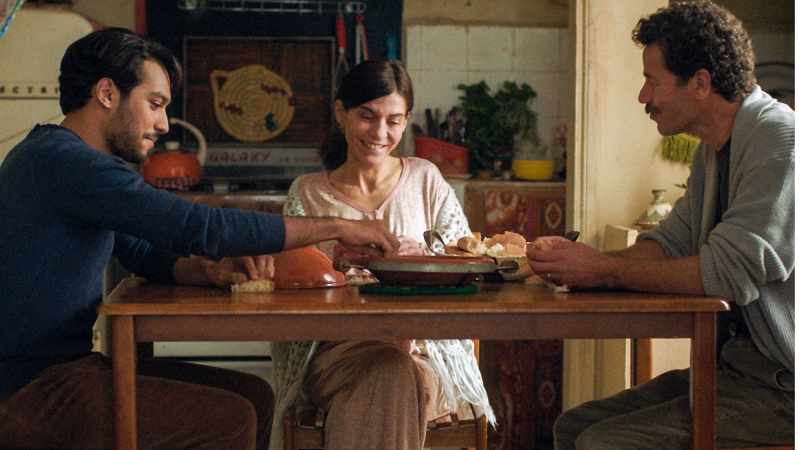




Ang Lee’s Brokeback Mountain (2005) meets Ingmar Bergman’s Cries and Whisper (1972), with a touch of Arab female sensibility. This is a movie so powerful that it is guaranteed to stay with you for a long time. A real powerhouse drama guaranteed to move even the most homophobic and sexist of viewers. Moroccan director Maryam Touzani succeeds in creating a film that’s profound and respectful of both its male and also of its female characters.
Fifty-something Halim (Saleh Bakri) lives with his wife Mina (Lubna Azabal) of about the same age. They have been married for decades. Halim is an experienced maleem (tailor) who runs a shop in the local souk, assisted by his spouse and a young, beautiful and devoted apprentice called Youssef (Ayoub Missioui). He is working on the titular blue dress, a sumptuous robe and symbol of status that is passed from generation to generation. He refuses to use a sewing machine and instead works on the ware by hand, to the disappointment of the demanding and yet impatient client. Halim treats the delicate fabric with tender loving care. Much in the same way as Touzani handles her film.
Our two male protagonists are attracted to each other, yet unable to explore their desire. That’s for two reasons. Number one: Morocco is a very homophobic society. Number two: Mina is succumbing to a terrible malaise, and this has a tremendous impact on Halim’s morale. The name of the terminal disease is never revealed, but the symptoms suggest breast cancer. In one of the movie’s most powerful scenes, our protagonist shares a very large scar with the audiences, bringing most of us to tears. Yet Nina does not bemoan her tragic predicament. Instead, she wants to fend for herself, without evoking pity and distress. She is not driven by pride, but instead humanity and compassion. She is as strong as a “rock”, as her husband puts, and the only solid foundation of his life. Halim lost his mother at birth, and his father despised him (pehaps because of his homosexuality?).
This is a film about love and compassion. The three leads are extremely good, but it is Azabal that stands in the skin of the pallid and scrawny Mina. At first, her pearly, jet black eyes look cruel and unforgiving. They are transfixed by fear. This begins to change after Mina stops her treatment and accepts her impeding death. Her eyes lighten up only to reveal a kind and selfless person. Her love for her husband knows no boundaries.

This is a movie with impeccable production values. The cinematography is colourful and intricate, just like the frills of the blue caftan. The camera movements are subtle and soothing. The film offers intimate portrait of Morocco, complete with narrow streets, passersby on lavish tunics, fragrant food cooked in tajines, bustling hamams, energetic music and dainty religious rituals. The story takes place in an undisclosed city, at also at an undisclosed time. Probably the ’80s or the ’90s, judging by the clothes and the absence of mobile phones.
Don’t expect the graphic carnal interaction of Ang Lee’s gay classic. This is a film made in a country with strict censorship, and an audience with sensibilities. Sexual interaction is instead implied with subtle gestures at the hamam, such as a cabin door being shut or a towel falling to the ground. The homoerotic flavours, on the other hand, are everywhere: Halim sniffs Youssef’s hair (not in creepy Joe Biden style!), the two man embrace vigorously and nearly engage in a kiss. Their relationship does not feel watered down and sanitised, but instead treated with some respectful distance. The scene in which Mina attempts to have sex with sex with her husband, who is not attracted to her, is the strongest one in the movie: you can’t help but feel sorry for the two agonising characters. There is no ambiguity: Halim and Youssef are two gay man profoundly in love. The love that dares not speak its name.
The irony is that I watched one of the best gay movies I’ve seen in a long time in Saudi Arabia of all places. The fact that I was in company of attentive and deferential locals makes this an even more memorable viewing experience. This is a film as universal as it can be. I hope it that receives wide distribution in the Arab world, the West and beyond.
The Blue Caftan showed at the 2nd Red Sea International Film Festival, when this piece was originally written. It was part of the Festival Favourites Strand. It was one of the 35 movies in the festival made by a woman director. The movie premiered earlier in the year in the Un Certain Regard section of Cannes. In UK cinemas on Friday, May 5th; also available on BFI Player
















